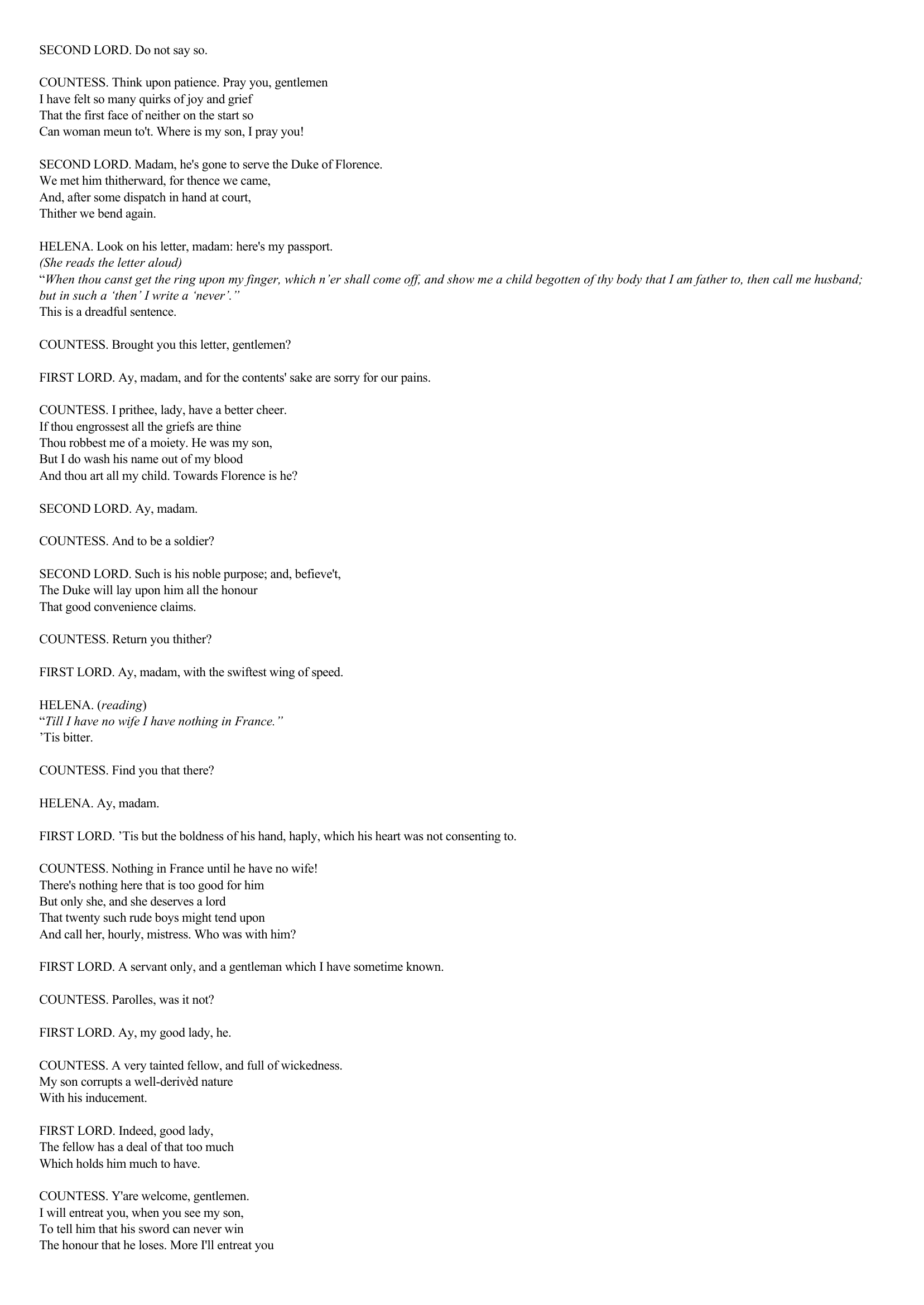Excerpt from All's Well That Ends Well - anthology.
Publié le 12/05/2013

Extrait du document
«
SECOND LORD.
Do not say so.
COUNTESS.
Think upon patience.
Pray you, gentlemenI have felt so many quirks of joy and griefThat the first face of neither on the start soCan woman meun to't.
Where is my son, I pray you!
SECOND LORD.
Madam, he's gone to serve the Duke of Florence.We met him thitherward, for thence we came,And, after some dispatch in hand at court,Thither we bend again.
HELENA.
Look on his letter, madam: here's my passport.(She reads the letter aloud)“When thou canst get the ring upon my finger, which n’er shall come off, and show me a child begotten of thy body that I am father to, then call me husband; but in such a ‘then’ I write a ‘never’.” This is a dreadful sentence.
COUNTESS.
Brought you this letter, gentlemen?
FIRST LORD.
Ay, madam, and for the contents' sake are sorry for our pains.
COUNTESS.
I prithee, lady, have a better cheer.If thou engrossest all the griefs are thineThou robbest me of a moiety.
He was my son,But I do wash his name out of my bloodAnd thou art all my child.
Towards Florence is he?
SECOND LORD.
Ay, madam.
COUNTESS.
And to be a soldier?
SECOND LORD.
Such is his noble purpose; and, befieve't,The Duke will lay upon him all the honourThat good convenience claims.
COUNTESS.
Return you thither?
FIRST LORD.
Ay, madam, with the swiftest wing of speed.
HELENA.
( reading ) “Till I have no wife I have nothing in France.”’Tis bitter.
COUNTESS.
Find you that there?
HELENA.
Ay, madam.
FIRST LORD.
’Tis but the boldness of his hand, haply, which his heart was not consenting to.
COUNTESS.
Nothing in France until he have no wife!There's nothing here that is too good for himBut only she, and she deserves a lordThat twenty such rude boys might tend uponAnd call her, hourly, mistress.
Who was with him?
FIRST LORD.
A servant only, and a gentleman which I have sometime known.
COUNTESS.
Parolles, was it not?
FIRST LORD.
Ay, my good lady, he.
COUNTESS.
A very tainted fellow, and full of wickedness.My son corrupts a well-derivèd natureWith his inducement.
FIRST LORD.
Indeed, good lady,The fellow has a deal of that too muchWhich holds him much to have.
COUNTESS.
Y'are welcome, gentlemen.I will entreat you, when you see my son,To tell him that his sword can never winThe honour that he loses.
More I'll entreat you.
»
↓↓↓ APERÇU DU DOCUMENT ↓↓↓
Liens utiles
- Excerpt from Twelfth Night - anthology.
- Excerpt from Troilus and Cressida - anthology.
- Excerpt from Titus Andronicus - anthology.
- Excerpt from Timon of Athens - anthology.
- Excerpt from The Winter's Tale - anthology.




